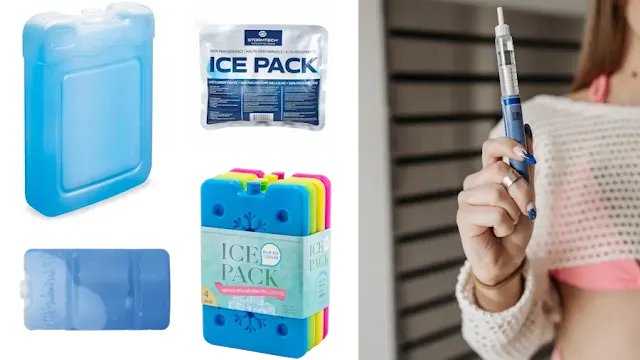Traveling with medication that requires refrigeration adds an extra layer of complexity to your journey, especially when navigating India's diverse landscapes and bustling airports. Whether you're exploring the majestic Himalayas or soaking up the sun in Goa, here are essential tips for safely packing and transporting cold-chain medications for air travel, whether in your handbag or checked bags.
Affordable Eye and Ear Drops in India Attracting NRIs
Eye and ear drops are notably more affordable in India, prompting many Non-Resident Indians (NRIs) to bring them back home. Among these medications are Latanoprost, Azasite, and Chloramphenicol, which require refrigeration for proper storage.
Understanding Your Medication
Before embarking on your journey, it's crucial to understand the specific requirements of your medication. Some drugs, such as insulin, certain vaccines, eye drops, and biologics, need to be stored within a narrow temperature range to maintain their effectiveness. Consult your healthcare provider or pharmacist for guidance on proper storage and transportation.
Choose the Right Packaging
Invest in insulated containers or travel coolers designed to maintain cold temperatures for an extended period. These containers are typically equipped with gel packs or ice packs that help regulate the temperature inside, providing a safe environment for your medication during transit.
Can you take ice packs on a plane for medication?
Yes, you can take ice packs on a plane for medication. They are allowed in carry-on or checked bags to keep medication cool. Make sure to inform security and pack them properly to prevent leaks or spills.
How do you pack cold medicine for travel?
When traveling, pack cold medicine in your carry-on bag for safety. Keep medications in original containers and place them in a labeled plastic bag within a cooling container. This ensures security and ease of access during your journey.
Plan Ahead for Air Travel
When flying within India, plan your travel itinerary with your medication in mind. Opt for direct flights whenever possible to minimize the time your medication spends outside of refrigeration. Additionally, inform airline staff about your medical condition and the need to carry refrigerated medication to ensure smooth security checks and boarding procedures.
Handbag or Checked Bags: Know Your Options
Deciding whether to carry your medication in your handbag or checked bags depends on several factors, including the duration of your flight, the availability of in-flight refrigeration, and the size of your medication supply. As a general rule, it's recommended to keep your medication close at hand in your carry-on bag to maintain control over its temperature and accessibility.
Tips for Handbag Storage
If storing your medication in your handbag, use a compact insulated pouch or mini cooler to keep it secure and protected from temperature fluctuations. Place gel packs or frozen water bottles alongside your medication to maintain cold temperatures throughout your journey. Remember to inform security personnel about your refrigerated medication during screening processes.
Considerations for Checked Bags
If you must stow your medication in checked luggage, take extra precautions to ensure its safety. Pack your medication in a sturdy insulated container and place it in the center of your suitcase surrounded by clothing or towels for additional insulation. Label the container clearly with a "Medical Supplies" sticker to alert baggage handlers to its importance.
Monitor Temperature Throughout Your Journey
Stay vigilant about monitoring the temperature of your medication throughout your journey. Carry a portable thermometer to periodically check the temperature inside your insulated container and adjust as needed by adding or removing gel packs.
Emergency Preparedness
In case of unexpected delays or emergencies, carry extra medication doses and a backup cooling method, such as instant cold packs or a portable refrigerator. Familiarize yourself with local pharmacies and medical facilities at your destination in case you need assistance replenishing your medication supply.
Which drugs require cold storage?
Injections Requiring Pharmaceutical Cold Storage: Some pharmaceuticals are safe to store at room temperature for a limited time, typically around a month. However, beyond this period, refrigeration becomes essential to preserve their integrity. Here are some examples:
- Insulin
- Victoza
- Botox
- Humira
- Byetta
- All vaccines
- Caverject
Tablets Requiring Refrigeration: While tablets are often associated with room temperature storage, certain medications necessitate refrigeration to maintain their potency. These include:
- Alkeran
- VePesid
- Leukeran
Ear and Eye Drops Requiring Refrigeration: Even liquids for topical use like ear and eye drops require refrigeration in some cases to prevent degradation. Notable examples are:
- Azasite
- Chloramphenicol
- Latanoprost
Refrigeration Isn’t Just for Medicine: It's not only medications that require refrigeration; biological materials like blood, tissue, and organs also depend on it for preservation. For instance, clinical trials and biological samples must be stored at extremely low temperatures, such as -150 degrees Celsius, for a minimum of 10 days to maintain their viability.
Ensuring proper storage conditions for pharmaceuticals and biological materials is essential to uphold their efficacy and safety standards. Whether it's vaccines, tablets, or biological samples, maintaining the cold chain is crucial in the healthcare industry.
Final Thoughts
Traveling with medication that requires refrigeration requires careful planning and preparation, but with the right strategies in place, you can ensure the safety and efficacy of your treatment while exploring the wonders of India. By following these essential travel tips and taking proactive measures to protect your medication, you can embark on your journey with confidence and peace of mind. Safe travels!
Do airport x-rays affect medications
Transporting Refrigerated Medication on India Flights
Travelling with Medicines to India






No comments:
Post a Comment